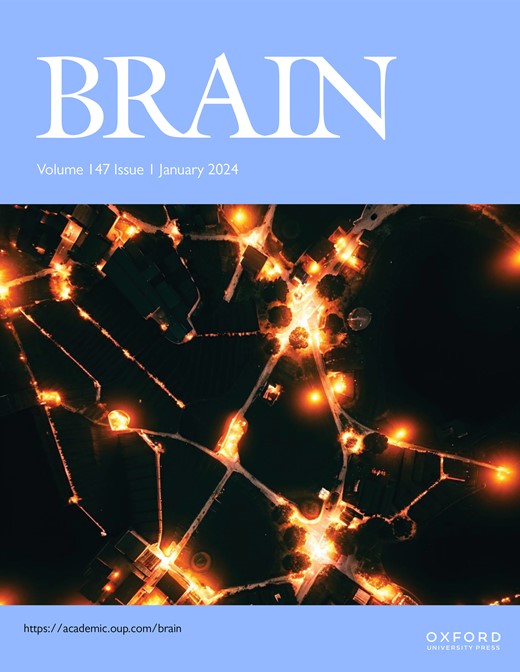Radiosurgery versus observation for brainstem cavernous malformations: a 5-year multicentre cohort study.
IF 11.7
1区 医学
Q1 CLINICAL NEUROLOGY
引用次数: 0
Abstract
The role of radiosurgery in preventing haemorrhage in brainstem cavernous malformations remains a subject of debate. This study aims to evaluate whether radiosurgery provides a protective benefit against haemorrhage in these patients. This multicentre, prospective observational study was conducted in 17 centres and enrolled eligible patients with brainstem cavernous malformations consecutively. Data collected included clinical baseline information, radiosurgery planning details, periodic follow-up evaluations, and any adverse radiation effects. The primary outcome of the study was the incidence of first prospective haemorrhage, while the secondary outcome was the development of new or worsening neurological dysfunctions. The impact of radiosurgery was assessed using multivariate Cox regression analysis. From March 2016 to August 2018, the study enrolled 377 patients: 280 in the observation group receiving standard care alone and 97 in the radiosurgery group receiving both radiosurgery and standard care. The overall cohort consisted of 173 females (45.9%) with a mean age of 40.5 years (range, 18-68 years), and there were no significant differences in baseline characteristics between the two groups. After a median follow-up period of 70 months, haemorrhage occurred in 25.0% (n = 70) of patients in the observation group and 10.3% (n = 10) of patients in the radiosurgery group. Multivariate Cox regression analysis identified radiosurgery as an independent protective factor against haemorrhage (hazard ratio 0.379, 95% confidence interval 0.195-0.738, P = 0.004). Following 1:2 propensity score matching, the incidence of prospective haemorrhage were 24.9% (45/181) in the observation group compared to 10.3% (10/97) in the radiosurgery group (hazard ratio 0.379, 95% confidence interval 0.190-0.755, P = 0.006). Adverse radiation effects were observed in 12 patients (12.4%), with none were permanent. Additionally, new or worsening neurological dysfunctions were significantly more common in the observation group (28.9%) compared to the radiosurgery group (16.5%) (P = 0.016). These results suggest that radiosurgery is associated with a low rate of haemorrhage in patients with brainstem cavernous malformations and could provide a benefit in selected patients. However, further research is required to confirm these findings.脑干海绵畸形放射手术与观察:一项为期 5 年的多中心队列研究。
放射手术在预防脑干海绵状畸形出血方面的作用仍存在争议。本研究旨在评估放射外科手术是否对这些患者的出血有保护作用。这项多中心、前瞻性观察研究在 17 个中心进行,连续招募了符合条件的脑干海绵畸形患者。收集的数据包括临床基线信息、放射手术计划详情、定期随访评估以及任何不良放射效应。研究的主要结果是首次前瞻性出血的发生率,次要结果是出现新的或恶化的神经功能障碍。采用多变量 Cox 回归分析评估了放射手术的影响。从2016年3月到2018年8月,该研究共招募了377名患者:观察组中有 280 人仅接受标准护理,放射外科组中有 97 人同时接受放射外科手术和标准护理。总体队列中有 173 名女性(45.9%),平均年龄为 40.5 岁(18-68 岁),两组患者的基线特征无显著差异。中位随访期为70个月,观察组中有25.0%(n=70)的患者发生出血,放射手术组中有10.3%(n=10)的患者发生出血。多变量 Cox 回归分析确定放射手术是出血的独立保护因素(危险比 0.379,95% 置信区间 0.195-0.738,P = 0.004)。经过 1:2 倾向评分匹配后,观察组的前瞻性出血发生率为 24.9%(45/181),而放射手术组为 10.3%(10/97)(危险比为 0.379,95% 置信区间为 0.190-0.755,P = 0.006)。12名患者(12.4%)出现放射不良反应,但无永久性不良反应。此外,与放射手术组(16.5%)相比,观察组出现新的或恶化的神经功能障碍的比例(28.9%)明显更高(P = 0.016)。这些结果表明,放射外科手术与脑干海绵畸形患者的低出血率相关,可为特定患者带来益处。不过,还需要进一步的研究来证实这些发现。
本文章由计算机程序翻译,如有差异,请以英文原文为准。
求助全文
约1分钟内获得全文
求助全文
来源期刊

Brain
医学-临床神经学
CiteScore
20.30
自引率
4.10%
发文量
458
审稿时长
3-6 weeks
期刊介绍:
Brain, a journal focused on clinical neurology and translational neuroscience, has been publishing landmark papers since 1878. The journal aims to expand its scope by including studies that shed light on disease mechanisms and conducting innovative clinical trials for brain disorders. With a wide range of topics covered, the Editorial Board represents the international readership and diverse coverage of the journal. Accepted articles are promptly posted online, typically within a few weeks of acceptance. As of 2022, Brain holds an impressive impact factor of 14.5, according to the Journal Citation Reports.
 求助内容:
求助内容: 应助结果提醒方式:
应助结果提醒方式:


